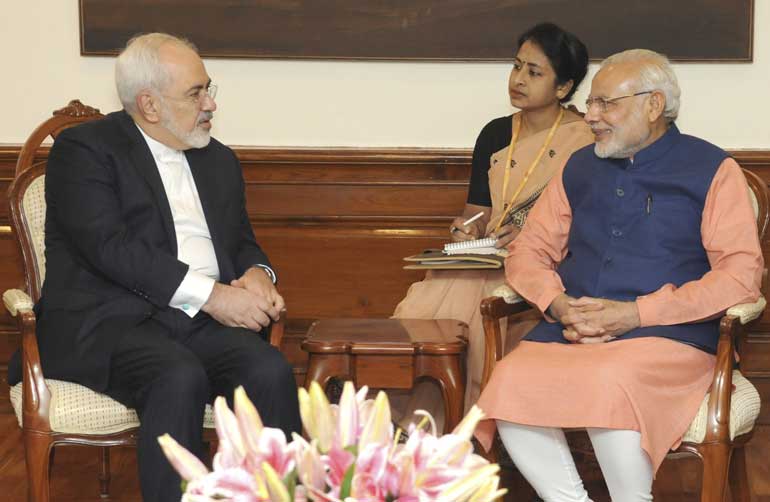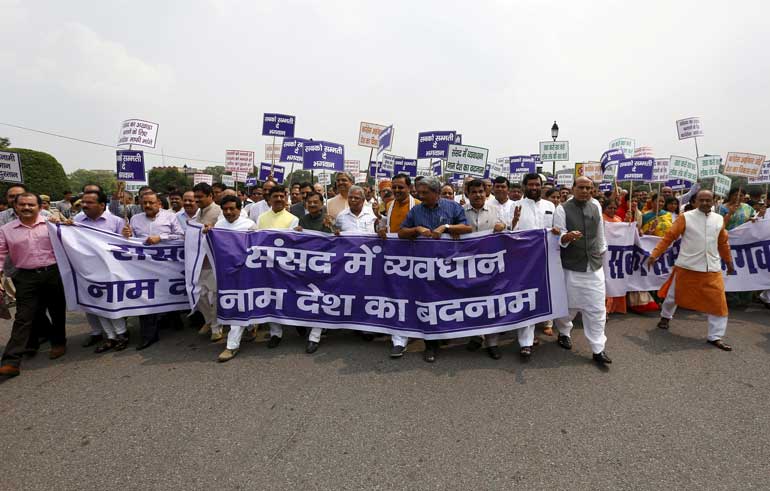Thursday Feb 19, 2026
Thursday Feb 19, 2026
Saturday, 15 August 2015 00:00 - - {{hitsCtrl.values.hits}}

Iran’s Foreign Minister Mohammad Javad Zarif (L) speaks with Indian Prime Minister Narendra Modi (R) during their meeting in New Delhi, India, 14 August, 2015. Zarif is on a two-day visit to India - Reuters

Lawmakers from India’s ruling Bharatiya Janata Party (BJP) and its allies, take part in what they say is a “Save Democracy” march outside the parliament in New Delhi, India, August 13, 2015. Indian Prime Minister Narendra Modi’s reform agenda suffered a major blow on Thursday when lawmakers ended the summer parliament session without approving a tax reform bill aimed at boosting economic growth. The banner reads: “Obstruction in parliament, spoiling the country’s name.” REUTERS
Reuters: Prime Minister NarendraModi’s reform agenda suffered another major setback on Thursday when lawmakers ended the monsoon session of Parliament acrimoniously and without approving a tax reform bill aimed at faster economic growth.
The Goods and Services Tax (GST) bill is seen as low-hanging fruit among free-market reforms as it has rare bipartisan support. But it fell victim to an impasse over allegations of impropriety against Modi’s cabinet and party colleagues.
Modi’s failure to secure parliament’s backing for the measure could push back more contentious bills such as labour and land legislation, which businesses and economists say are critical to create millions of jobs.
No laws were passed in the Rajya Sabha in the three-week session. Debate descended into insults that spilled to the streets, where opposition lawmakers marched and Modi’s cabinet staged a counter protest under a statue of Mahatma Gandhi.
Finance Minister ArunJaitley angrily said delaying the bill until the parliament opens in December will make it “extremely difficult” to meet a deadline to launch by April the new sales tax, which he says will add two points to economic growth.
He held out hope of meeting the deadline, saying the government might reconvene parliament earlier to pass GST.
“We have not taken any decision as yet,” he told reporters. “We are determined and will make all efforts to implement it (GST) from April.”
But the government first needs to reach a rapprochement with the opposition Congress party that is adamant in its demand for the resignation of three of Modi’s colleagues.
Political opposition had already forced Modi to backtrack on a pro-business land bill.
“The bigger picture is that PM Modi has missed another major opportunity to push ahead with contentious reforms,” Shilan Shah, an economist with Capital Economics, wrote in a research note. Indian businesses have long coveted GST to subsume a thicket of union and state levies that inflate costs. The tax has been watered down to win the backing of states, but HSBC said in a note this week it would still add 60 basis points to growth.
The Congress party, which lost power to Modi last year, championed the measure while in office. By scuttling the tax, for now, the party has denied Modi a victory ahead of his annual Independence Day speech on Saturday.
The Congress party’s repeated disruptions made the parliamentary session the least productive since Modi took office in May 2014.
Modi has asked his lawmakers as well as ministers to launch a nationwide campaign against the tactics of the Congress party.
“It’s been frustrating for the whole country,” Jaitley said. “This was a disruption without a cause.”